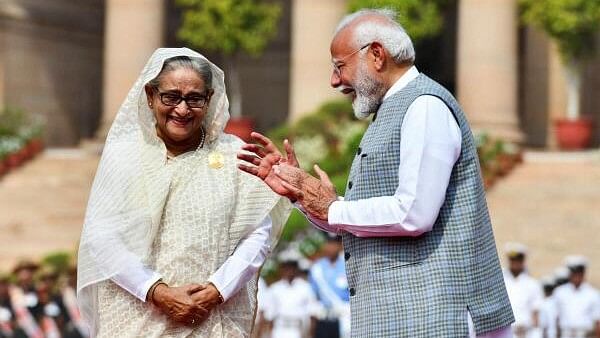
Sheikh Hasina with Prime Minister Narendra Modi
Credit: Reuters File Photo
The political upheaval in Bangladesh following Sheikh Hasina’s exit poses two significant challenges for India: the potential increase in China’s influence and the rise in violence against minorities, particularly Hindus, which could lead to an influx of refugees into India. These issues will require careful management to safeguard India’s interests.
China’s influence in Bangladesh has grown substantially over the years, particularly through the Belt and Road Initiative (BRI). Bangladesh has been a key partner in this initiative, with China investing over $25 billion in the country. These investments have been channelled into various infrastructure projects but have also indebted Bangladesh to China.
China has also strengthened its military ties with Bangladesh, which is China’s second-largest defence export market. Bangladesh’s armed forces operate a range of Chinese defence equipment, including submarines and frigates. China is also helping Bangladesh build a large new naval base, which could potentially serve as a Chinese military base. The militaries of the two countries are also conducting exercises.
Despite her close ties with China, Sheikh Hasina maintained a balanced foreign policy. She was a staunch supporter of the BRI but also ensured that Bangladesh’s relationship with India remained strong. Under her leadership, India and Bangladesh collaborated closely on security issues, including counter-terrorism efforts and the management of insurgent groups in the Northeast.
However, the potential return of Khaleda Zia’s Bangladesh Nationalist Party (BNP) and its ally, Jamaat-e-Islami, could alter this dynamic. The BNP and Jamaat have historically been anti-India and pro-China. If they come to power, Bangladesh’s tilt towards China could become more pronounced, at the expense of its relationship with India, complicating New Delhi’s security calculus.
The second challenge facing India is the potential for increased violence against minorities, particularly Hindus in Bangladesh. Since the protests against Hasina began and her subsequent exit, there have been numerous attacks on minorities, especially Hindus, leading to large protests in Bangladesh.
This situation can get worse under a BNP-Jamaat government, which has been associated with radical Islamist ideologies that translate into hostility towards minority communities. During Khaleda Zia’s previous terms in office, there were numerous incidents of violence against Hindus, who have traditionally supported the Awami League.
The rise of Islamism in Bangladesh, which threatens its Hindu population, could lead to their migration to India straining India’s resources, particularly in border states. This can also have a bearing on India’s internal social cohesion, especially in the age of social media and religious polarisation.
In addition to the targeted violence against minorities, instability due to political violence, economic downturn, and social unrest could force many Bangladeshis to seek refuge in India, creating a humanitarian crisis for India.
India has previously dealt with refugee crises, notably in 1971, when millions of Bangladeshis fled to India to escape the Pakistan Army’s genocide of Bengalis. While the current situation is not as dire, if it deteriorates, domestic pressure on the Indian government to intervene, as it did in 1971, could increase.
Under a BNP-Jamaat government, there is a real possibility that Bangladesh could become a breeding ground for anti-India activities, particularly if Pakistan’s Inter-Services Intelligence (ISI) is able to re-establish its networks in the country. Sheikh Hasina had ruthlessly cracked down on these networks, making her an important ally for India. This could lead to cross-border terrorism and fuel insurgency in India’s northeast.
Moreover, the BNP-Jamaat’s pro-China stance could further complicate India’s efforts to manage its relationship with Bangladesh. China has historically supported the BNP and Jamaat, and their return to power could strengthen China’s influence in Bangladesh. Peace and stability in Bangladesh, along with peaceful borders, are crucial for India, as it already faces the twin threats on its northern and western borders. The last thing India needs is an active border with Bangladesh, and worse of all, a situation developing that leads to calls for an intervention.
India must prepare for the challenges a BNP-Jamaat government in Bangladesh might bring. India must strengthen border security, enhance efforts to counter China’s influence, and work with international partners to ensure that Bangladesh does not become a haven for anti-India activities.
At the same time, India should engage with all political actors in Bangladesh, including the BNP, to ensure that its interests are safeguarded regardless of the outcome of the country’s political transition.
(The writer is adjunct scholar, strategic studies at the Takshashila Institution)